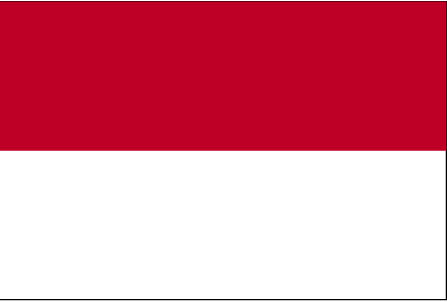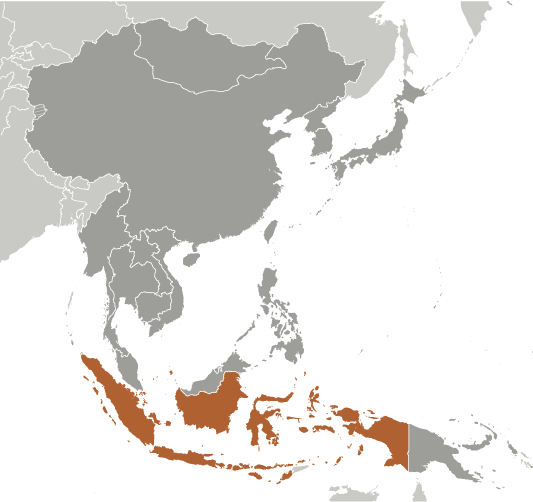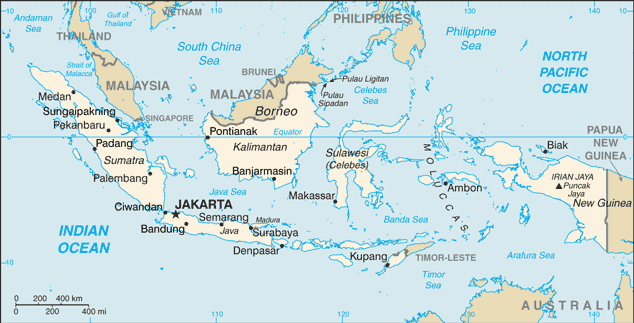The Dutch began to colonize Indonesia in the early 17th century; Japan occupied the islands from 1942 to 1945. Indonesia declared its independence after Japan's surrender, but it required four years of intermittent negotiations, recurring hostilities, and UN mediation before the Netherlands agreed to transfer sovereignty in 1949. Indonesia's first free parliamentary election after decades of repressive rule took place in 1999. Indonesia is now the world's third-largest democracy, the world's largest archipelagic state, and home to the world's largest Muslim population. Current issues include: alleviating poverty, improving education, preventing terrorism, consolidating democracy after four decades of authoritarianism, implementing economic and financial reforms, stemming corruption, holding the military and police accountable for past human rights violations, addressing climate change, and controlling avian influenza. In 2005, Indonesia reached a historic peace agreement with armed separatists in Aceh, which led to democratic elections in Aceh in December 2006. Indonesia continues to face a low intensity separatist movement in Papua.
Country Name
Conventional long form:Republic of Indonesia
Conventional short form:Indonesia
Local long form:Republik Indonesia
Local short form:Indonesia
Former:Netherlands East Indies, Dutch East Indies
Government Type
republic
Capital
Name:Jakarta
Geographic coordinates: 6 10 S, 106 49 E
Time difference:UTC+7 (12 hours ahead of Washington, DC during Standard Time)
note: Indonesia is divided into three time zones
Administrative divisions
30 provinces (provinsi-provinsi, singular - provinsi), 2 special regions* (daerah-daerah istimewa, singular - daerah istimewa), and 1 special capital city district** (daerah khusus ibukota); Aceh*, Bali, Banten, Bengkulu, Gorontalo, Jakarta Raya**, Jambi, Jawa Barat, Jawa Tengah, Jawa Timur, Kalimantan Barat, Kalimantan Selatan, Kalimantan Tengah, Kalimantan Timur, Kepulauan Bangka Belitung, Kepulauan Riau, Lampung, Maluku, Maluku Utara, Nusa Tenggara Barat, Nusa Tenggara Timur, Papua, Papua Barat, Riau, Sulawesi Barat, Sulawesi Selatan, Sulawesi Tengah, Sulawesi Tenggara, Sulawesi Utara, Sumatera Barat, Sumatera Selatan, Sumatera Utara, Yogyakarta*
note: following the implementation of decentralization beginning on 1 January 2001, regencies and municipalities have become the key administrative units responsible for providing most government services
Independence
17 August 1945 (declared); 27 December 1949 (by the Netherlands)
note: in August 2005 the Netherlands announced that it had recognized de facto Indonesian independence on 17 August 1945
National Holiday
Independence Day, 17 August (1945)
Constitution
August 1945; abrogated by Federal Constitution of 1949 and Provisional Constitution of 1950, restored 5 July 1959; series of amendments concluded in 2002
Legal system
based on Roman-Dutch law, substantially modified by indigenous concepts and by new criminal procedures and election codes; has not accepted compulsory ICJ jurisdiction
Suffrage
17 years of age; universal and married persons regardless of age
Executive branch
Chief of state:President Susilo Bambang YUDHOYONO (since 20 October 2004); Vice President BOEDIONO (since 20 October 2009); note - the president is both the chief of state and head of government
Head of government:President Susilo Bambang YUDHOYONO (since 20 October 2004); Vice President BOEDIONO (since 20 October 2009)
Cabinet:Cabinet appointed by the president
(For more information visit the World Leaders website)
Elections:president and vice president elected for five-year terms (eligible for a second term) by direct vote of the citizenry; election last held on 8 July 2009 (next to be held in 2014)
Election results:Susilo Bambang YUDHOYONO elected president; percent of vote - Susilo Bambang YUDHOYONO 60.8%, MEGAWATI Sukarnoputri 26.8%, Jusuf KALLA 12.4%
Legislative branch
People's Consultative Assembly (Majelis Permusyawaratan Rakyat or MPR) is the upper house; it consists of members of the DPR and DPD and has role in inaugurating and impeaching the president and in amending the constitution but does not formulate national policy; House of Representatives or Dewan Perwakilan Rakyat (DPR) (560 seats, members elected to serve five-year terms), formulates and passes legislation at the national level; House of Regional Representatives (Dewan Perwakilan Daerah or DPD), constitutionally mandated role includes providing legislative input to DPR on issues affecting regions (132 members, four from each of Indonesia's 30 provinces, two special regions, and one special capital city district)
Elections: last held on 9 April 2009 (next to be held in 2014)
Election results:percent of vote by party - PD 20.9%, GOLKAR 14.5%, PDI-P 14.0%, PKS 7.9%, PAN 6.0%, PPP 5.3%, PKB 4.9%, GERINDRA 4.5%, HANURA 3.8%, others 18.2%; seats by party - PD 148, GOLKAR 107, PDI-P 94, PKS 57, PAN 46, PPP 37, PKB 28, GERINDRA 26, HANURA 17
note: 29 other parties received less than 2.5% of the vote so did not obtain any seats; because of election rules, the number of seats won does not always follow the percentage of votes received by parties
Judicial branch
Supreme Court or Mahkamah Agung is the final court of appeal but does not have the power of judicial review (justices are appointed by the president from a list of candidates selected by the legislature); in March 2004 the Supreme Court assumed administrative and financial responsibility for the lower court system from the Ministry of Justice and Human Rights; Constitutional Court or Mahkamah Konstitusi (invested by the president on 16 August 2003) has the power of judicial review, jurisdiction over the results of a general election, and reviews actions to dismiss a president from office; Labor Court under supervision of Supreme Court began functioning in January 2006; the Anti-Corruption Court has jurisdiction over corruption cases brought by the independent Corruption Eradication Commission
Political Parties and Leaders
Democrat Party or PD [Anas URANINGRUM]; Functional Groups Party or GOLKAR [Aburizal BAKRIE]; Great Indonesia Movement Party or GERINDRA [SUHARDI]; Indonesia Democratic Party-Struggle or PDI-P [MEGAWATI Sukarnoputri]; National Awakening Party or PKB [Muhaiman ISKANDAR]; National Mandate Party or PAN [Hatta RAJASA]; People's Conscience Party or HANURA [WIRANTO]; Prosperous Justice Party or PKS [Luthfi Hasan ISHAQ]; United Development Party or PPP [Suryadharma ALI]
Political pressure groups and leaders
Commission for the "Disappeared" and Victims of Violence or KontraS; Indonesia Corruption Watch or ICW; Indonesian Forum for the Environment or WALHI; Islamic Defenders Front or FPI; People's Democracy Fortress or Bendera
International organization participation
ADB, APEC, APT, ARF, ASEAN, BIS, CICA (observer), CP, D-8, EAS, FAO, G-15, G-20, G-77, IAEA, IBRD, ICAO, ICC, ICRM, IDA, IDB, IFAD, IFC, IFRCS, IHO, ILO, IMF, IMO, IMSO, Interpol, IOC, IOM (observer), IPU, ISO, ITSO, ITU, ITUC, MIGA, MONUC, NAM, OIC, OPCW, PIF (partner), UN, UNAMID, UNCTAD, UNESCO, UNIDO, UNIFIL, UNMIL, UNMIS, UNWTO, UPU, WCO, WFTU, WHO, WIPO, WMO, WTO
Diplomatic representation in the US
Chief of mission:Ambassador (vacant); Charge d'Affaires Salman Al FARISI
Chancery:2020 Massachusetts Avenue NW, Washington, DC 20036
Telephone:[1] (202) 775-5200
FAX:[1] (202) 775-5365
Consulate(s) general:Chicago, Houston, Los Angeles, New York, San Francisco
Diplomatic representation from the US
Chief of mission: Ambassador Cameron R. HUME
Embassy:Jalan 1 Medan Merdeka Selatan 4-5, Jakarta 10110
Mailing address:Unit 8129, Box 1, FPO AP 96520
Telephone:[62] (21) 3435-9000
FAX:[62] (21) 3435-9922
consulate(s) general: Surabaya
Flag description
two equal horizontal bands of red (top) and white; the colors derive from the banner of the Majapahit Empire of the 13th-15th centuries; red symbolizes courage, white represents purity
note: similar to the flag of Monaco, which is shorter; also similar to the flag of Poland, which is white (top) and red










